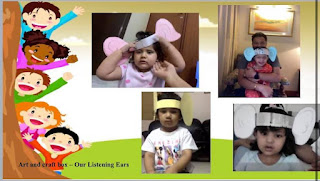Right Brain Training: Flashcard Benefits for Toddlers and Kids
Are you searching for a new way to train your child’s mind? Flashcards might be the perfect solution. Flashing colorful cards in front of your toddler grabs their attention quickly. This method has proven effective in engaging children with a lasting impact. The top play school in Gurgaon applies this method for easy learning. Flashcards can be an effective and fun tool for learning. By shuffling a deck of flashcards and presenting them to your child, you introduce new information in an engaging way.
Let’s explore the benefits of flashcard learning for toddlers and kids.
What Are Flashcards for Kids?
Flashcards are colorful cards with limited information like images, concepts, ideas, and words. They are designed for in-depth learning. The main purpose is to strengthen a child’s mind and increase attention span. These cards help children recall information from pictures quickly. Flashcards are an easy training tool at any preschool school that help kids absorb and retain information. They support self-assessment, allowing your toddler to explore and develop a love for learning. You will notice your child picking up information quickly and remembering it long-term.
When Is a Good Age to Introduce Flashcards?
You can introduce flashcards to your baby as early as six months. This step can enhance their early learning. Think of it as a way to stimulate a child’s right brain and increase awareness. For children around three to four months old, use infant stimulation flashcards. When they reach 12-13 months, you can introduce more complex information like numbers, phonics, and pictures. The younger your child, the easier it is to teach them. Stimulating your baby’s visual senses early helps them concentrate better since their visual communication pathway develops within three months.
Benefits of Using Flashcards
As per the top play school in Gurgaon, there are many benefits of using flashcards for toddlers and kids. Flashcards help improve knowledge and memory by processing information with ease. Here are some key benefits:
1. Improves Cognitive Development
Flashcard learning enhances a child’s cognitive and critical skills. It helps children recall information from pictures quickly. This method activates both hemispheres of the brain, improving learning potential in a fun, engaging way.
2. Develops Photographic Memory
Photographic memory involves recalling information quickly from pictures. Flashcards trigger visual stimuli, increasing brain capacity. This helps children retain detailed information, useful for both educational and non-educational purposes.
3. Improves Language Skills
Flashcards aim to improve children’s knowledge and cognitive skills. They also create interactive learning sessions. By exposing children to the same information repeatedly, they become familiar with it. You can even teach a new language with flashcards. This positively impacts their social and conversation skills.
4. Creates Visual Stimulation
Flashcards stimulate a child’s mind visually. This helps them recall information easily. Even after a long period, they can answer questions based on the flashcards. Flashcard learning captures and stimulates curiosity, leading to effective learning.
5. Increases Self-Confidence
Children need exposure to different bits of information daily. As they grasp this data, rewarding their efforts boosts self-confidence. Learning with flashcards helps them adapt quickly to new information. Parents should make these sessions short, fun, and interactive to keep children interested.
How to Make Flashcards for Kids
Making flashcards is simple and fun. You will need A5 size sheets. Display one subject per flashcard with a clear picture and neat background. Choose subjects based on your child’s interests. Here are the steps to create homemade flashcards:
Gather subject information.
Select clear pictures.
Add texts to the pictures.
Print and stick the pictures on the cards.
Laminate the flashcards.
Flashcard Teaching Strategies and Tips From Top Play School in Gurgaon
Children are quick learners, and flashcard learning promotes active recall. Here are some tips to keep in mind:
Avoid showing the same flashcards repeatedly. Flash two cards per second.
Choose subjects based on your child’s interests.
Update the flashcards' content regularly to avoid boredom.
Perform flashcard activities when your child is in a positive mood. Avoid sessions if your child is sleepy, sick, or stressed.
Take breaks between sessions and make it fun.
Ensure the flashcards are not too small or too colorful. They should be presented in an engaging manner.
Interactive Flashcard Activities
Engaging your child with flashcards can be a fun activity. Here are some interactive games to try:
Fast-Forward Quiz: Ask questions related to the flashcards.
Matching Games: Match pictures with corresponding words.
Guess Who?: Let your child guess the picture or word on the flashcard.
You can also shuffle the cards and present them differently each time. Segregate cards based on your child’s responses. If they answer correctly, create a separate pile. Once they master a set, introduce new information.
Conclusion
Flashcards are a powerful tool for right-brain training in toddlers and kids. They improve cognitive development, photographic memory, language skills, visual stimulation, and self-confidence. Introduce flashcards early to stimulate your child’s visual senses and enhance learning. Make the sessions short, fun, and interactive. Choose subjects based on your child’s interests and update the content regularly. With these tips and strategies from a preschool in Gurgaon, you can create an engaging and effective learning experience for your child.




Comments
Post a Comment